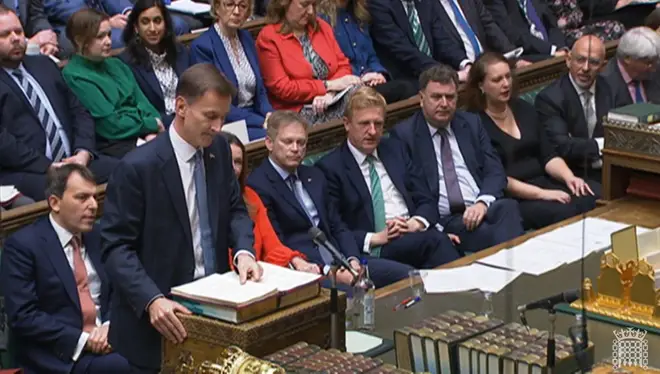
Richard Spurr 1am - 4am
17 November 2022, 11:55 | Updated: 18 November 2022, 00:23

Chancellor Jeremy Hunt introduced in a series of ‘eye-watering’ tax rises in an Autumn Statement aimed at plugging the multi-billion pound hole in Britain’s finances.
Mr Hunt told MPs: “We deliver a plan to tackle the cost of living crisis and rebuild our economy.
“Our priorities are stability, growth and public services.”
He said the financial crisis was an “international one and pledged to respond with “British values.”
“Global factors are the primary cause” of soaring inflation, he added. He said inflation was higher in Germany, the Netherlands and Italy and interest rates were rising faster in other countries.
Follow the latest LIVE on Global player
Live updates: Hunt unveils a brutal package of tax rises and spending cuts

Personal tax thresholds will be maintained at current levels for a 'further 2 years'
He said the world needs to be confident that Britain is able to pay its debts, saying “the United Kingdom will always pay its way.”
He unveiled a package plugging a £55bn black hole in the economy. The Office for Budget responsibility said the UK is now officially in a recession, predicting the economy will shrink by 1.4% next year.
The key measures announced on Thursday were:
In other measures, he announced electric vehicles will no longer be exempt from vehicle excise duty from April 2025 to make the system "fairer”. He said he will scale back support for energy bills from April 2023, and unveiled an increase in the national living wage from the current level of £9.50 for over 23s.

Hunt announces 9.7% rise in National Living Wage
He also announced an increase in budget for schools and the NHS, saying in 2023 and 2024 the government will invest an extra £2.3bn in schools.
He said there would be a public spending squeeze on all sectors except health - saying the NHS budget will be increased in each of the next two years by £3.3bn.
Mr Hunt said he was delivering a "balanced path to stability" which involves "taking difficult decisions".
The windfall tax on energy firms is expected to raise £14bn alone. The tax on oil and gas firms will increase and will be extended until March 2028 from December 2025.
"I have no objection to windfall taxes if they are genuinely about windfall profits caused by unexpected increases in energy prices," the Chancellor said.
"But any such tax should be temporary, not deter investment and recognise the cyclical nature of many energy businesses. Taking account of this, I have decided that from January 1st until March 2028 we will increase the Energy Profits Levy from 25% to 35%."

Electric vehicle owners will have to pay road tax from 2025, announces Jeremy Hunt
On a windfall tax on electricity generators, he said: "The structure of our energy market also creates windfall profits for low-carbon electricity generation so, from January 1st, we have also decided to introduce a new, temporary 45% levy on electricity generators. Together these taxes raise £14bn next year."
He told MPs: "Anyone who says there are easy answers is not being straight with the British people: some argue for spending cuts, but that would not be compatible with high-quality public services.
"Others say savings should be found by increasing taxes but Conservatives know that high tax economies damage enterprise and erode freedom.
"We want low taxes and sound money. But sound money has to come first because inflation eats away at the pound in people's pockets even more insidiously than taxes.
"So, with just under half of the £55 billion consolidation coming from tax, and just over half from spending, this is a balanced plan for stability."